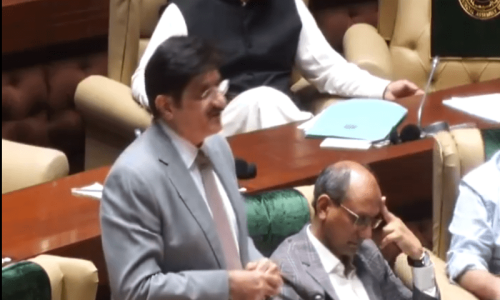UMERKOT, March 23: Supply of clean drinking water to the residents of Thar still appears to a distant dream as the government keeps sinking billion of rupees in unfeasible mega projects.
In the past decade, more than Rs7.95 billion has been spent on a number of schemes to provide clean water to residents of the region, comprising two districts — Tharparkar and Umerkot — with more than 1.7 million people living in arid area.
All of Tharparkar district while nine out of 27 union councils of Umerkot district fall in the arid area.
According to Raja Mukesh, a resident of Mithi, headquarters of Tharparkar district, people living in the area get freshwater only once a month. In the meantime, he said, people consume brackish water, while the rural population is only able to get their hands on brackish and contaminated water.
According to Nasrullah Samoon, a resident of Nagarparkar taluka, 150 kilometres away from Mithi, work had begun on a piped water scheme worth Rs950 million in the tenure of Dr Arbab Ghulam Rahim (2004 to 2008) as Sindh chief minister. (Dr Rahim had been elected from Tharparkar PS-60.) He said that for the past three months the work on the scheme has stopped 35 kilometres away from Nagarparkar.
Reverse osmosis plants Since 2004, 79 reverse osmosis plants have been installed in the area but most of them are unfeasible, said Mr Samoon, also a local activist.
The first batch of 29 plants had been installed during the tenure of Dr Rahim. Even though most of the plants installed in the first phase were unfeasible, former chief minister Syed Qaim Ali Shah granted permission for the installation of 25 more plants. Afterwards, on the recommendation of elected representatives, the president approved 25 more such reverse osmosis plants.
Initially, the reverse osmosis plants were constructed and installed by the Sindh Coal Authority (SCA), said Mr Samoon. In 2006, the SCA hired a private company to provide chemical and mechanical maintenance, and run the machinery.
In February 2012, all aspects of construction and installation of 25 reverse osmosis plants approved by the president were handed over to the private company by the SCA under a turnkey agreement.
Mr Samoon said that under the agreement, the company had to complete the construction and installation work on reverse osmosis plants within six months. But more than a year had passed and the project was in the doldrums.
According to him, the company did not have the expertise of installing tubewells and carrying out civil and electrical work.
This move had opened up a window of corruption, said Mr Samoon. As more mega projects came to Thar on the recommendations of PPP parliamentarians they were established without first conducting a feasibility study, which is mandatory before setting up any development or construction scheme.
Moreover, according to an SCA official, the private company was using vehicles and machinery owned by the SCA on reverse osmosis projects and others as well.
The agreement between the SCA and the private company had said nothing about the use of SCA machinery by the company.
He also alleged that a few SCA officials had also begun working for the private company on the sly. Naming an assistant director, the SCA official said that he had been installing tubewells using SCA machinery and equipment for the private company for Rs50,000.
However, SCA officials said that the authority had rented out the vehicles to the private company. Mithi SCA official in charge Arif Hussain Laghari told Dawn that the private company had used SCA equipment but only after it had been rented to them. When asked about SCA officials working for the private company on the sidelines, he said that it was not likely.
Public protests Meanwhile, recently scores of residents protested against the private company, accusing it of tampering with the water meters of reverse osmosis plants in 50 villages of Thar and demanding an inquiry into the matter.
The residents claimed that the reverse osmosis plants, which work for several hours a day, have only been run for between 500 and 700 hours in the past two years, not for 10,000 to 15,000 hours as claimed by the company. They alleged that the company in charge and his team had tampered with the meters to increase the reading for charging money from the government.
Responding to these allegations, company’s regional manager Muhammad Iqbal said that he would conduct an inquiry into the matter if he received any complaints. He said that stern action would be taken against anyone found guilty of tampering.
Meanwhile, the Mithi SCA official in charge, Mr Laghari, said that the company could not benefit from meter tampering since they could not claim any amount from the SCA or the government based on meter reading.













































Dear visitor, the comments section is undergoing an overhaul and will return soon.